News
20.11.2012
Global Soil Week: Soils Must be Protected
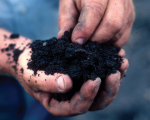
Stakeholders from civil society, government, business and science are currently gathering in Berlin for the First Global Soil Week. Taking place from 18-22 November, the aim of the conference is to find solutions to soil degradation: Worldwide, more than 24 billion tons of fertile soil are being lost each year. Erosion, the sealing of soil surfaces and desertification are all increasing. Over the four day event, participants will discuss the key issues and develop action plans for sustainable soil management. Topics such as the economics of land degradation, the challenges of raising soil awareness and the Voluntary Guidelines on Land Governance will be addressed in a series of dialogue sessions, panels and other events. With soils being essential for the production of over 90% of the world’s food, the link between soils and food security will also be discussed. In the run-up to the event, Professor Klaus Töpfer, Executive Director of the Institute for Advanced Sustainability Studies (IASS), organiser of the conference, warned that “Available fertile agricultural land is decreasing and, at the same time, we need to ensure food security of almost nine billion people”. The Global Soil Week is intended to serve as a platform to initiate follow-up actions on land and soil-related decisions made at the UN Conference on Sustainable Development (Rio+20) and takes place within the framework of the UN Food and Agriculture Organisation’s Global Soil Partnership.
15.11.2012
FAO Report highlights Dangers of Large Land Deals

In a new report published on Tuesday, the Food and Agriculture Organisation (FAO) warns that export-oriented, large-scale land acquisition could threaten food security in developing countries by replacing existing food production for local markets. The report comprises cases studies on agriculture-related foreign direct investment in nine countries, among them Brazil, Ghana, Senegal, Thailand and Uganda. It found that investment projects in which local farmers play an active role and maintain control over their land while using the investors’ capital, technology and marketing expertise were most beneficial to local economies and social development. “While a number of studies document the negative impacts of large-scale land acquisition in developing countries, there is much less evidence of its benefits to the host country. For investments involving large-scale land acquisition in countries where land rights are unclear and insecure, the disadvantages often outweigh the few benefits to the local community” conludes Pascal Liu from the FAO’s Trade and Markets Division. The report debunks the myth that these land deals generate employment for the local population: Several case studies showed that fewer jobs were created than initially promised, with demand for labour decreasing over time. Even the low-skilled jobs were given to non-locals. Foreign investors acquired the best plots of land with high soil fertility, irrigation and good market access, often leading to the displacement of local farmers and pastoralists, as well as the degradation of natural resources. The FAO stressed that investment in agriculture is needed – around 80 billion US dollar per year – to feed more than nine billion people in 2050. But “it is important that any international investment should bring development benefits to the receiving country if those investments are to be ‘win-win’ rather than ‘neo-colonialism”, said David Hallam, Director of the FAO’s Trade and Markets Division.
13.11.2012
Global Warming: Water Supplies for Agriculture in Danger

According to a new study conducted by scientists from Stanford University, global warming could reduce mountain snowpack in the Northern Hemisphere over the next century, threatening water supplies for drinking water and agricultural irrigation. The study, which was published in ‘Nature Climate Change’, analysed the impact of climate change on snowpack in the west of the United States, Alpine Europe, Central Asia and the Himalayas using different scenarios which encompass a rise in global temperatures between two and four degrees. The researchers concluded that there would be less snow accumulation in most regions. “We can infer that should these physical climate changes occur in the future, there would be impacts on water supply for agriculture and for human consumption and for natural ecosystems if the water storage and management systems are not adapted to those changes”, said Stanford University’s Climate Expert Noah Diffenbaugh who led the study. This could have negative effects, for example on agricultural production in California, the nation’s leading agricultural exporter, which is dependent on snowpack for crop irrigation. The study found that early spring snowmelt could lead to flooding and overflowing reservoirs in winter, while less water would be available in spring and summer, when water demand in agriculture is strongest. A lack of water later in the year could also worsen droughts, increase the number of insect pests and lead to species extinctions, both in the United States and elsewhere.
08.11.2012
FAO: Modest Decline in Global Food Prices

According to the Food and Agriculture Organisation (FAO), global food prices decreased by 1% from September to October. In addition, when comparing food prices from the first ten months of 2012 with the same period last year, prices are, on average, 8% lower. The FAO Food Price Index, published today, measures monthly price changes in a food basket consisting of commodities such as cereals, dairy products and oilseed. Food prices averaged 213 points in October, down two points from September. This is still below the previous price peaks in June 2008 and February 2011, 224 and 238 points respectively. However, prices are still dangerously close to the level of the 2007/2008 food price crisis. FAO Director-General José Graziano da Silva remains optimistic: “Despite tight markets, a set of conditions and measures have so far stopped international food prices from spiralling up as they did in 2007/2008 and 2009/2010.” In his opinion, the improved international coordination and market transparency resulting from the G20’s Agricultural Market Information System (AMIS) prevented “the worst drought in decades from turning into a food price crisis”. The slight decline in October was mainly triggered by lower international prices of cereals and oils/fats which made up for increased dairy and sugar prices. According to the FAO Food Outlook, a global market report also published today, world cereal production is expected to decrease by 2.7% from last year’s record harvest to an estimated 2.284 billion tonnes. World cereal stocks could drop to 497 million tonnes. The FAO Cereal Price Index reached 259 points in October – a rise of 12% compared to October last year, and only 15 points below the record high of 274 points in April 2008.
06.11.2012
Civil Society calls for change of course in Agricultural and Energy Policy

A substantial reform of agricultural and energy policies is needed in order to fight hunger and tackle climate change. This was the conclusion of the conference ‘Dialogue on Transformation’, which took place from 1 - 3 November in Bonn, Germany. Organised by development and environmental NGO, Germanwatch and the US-based Institute for Agriculture and Trade Policy (IATP), the event was attended by 140 civil society representatives from 22 countries. The participants discussed ways in which the right to food for the 870 million people currently undernourished worldwide could be implemented. According to Jim Harkness, President of IATP, the event allowed a long overdue dialogue to be held between civil society organisations on the transformations required in the energy and agricultural system. “These movements have often worked separately despite their common goal of a just and sustainable future”, he said. Another topic of the dialogue was a follow-up of the results from the UN Conference on Sustainable Development (Rio+20). The role of different actors in contributing to national reports on sustainable food production and food security was also discussed. At Rio+20, the Committee on World Food Security (CFS) was mandated to facilitate country-initiated assessments of agricultural policies. Dialogue participant Hans Herren, co-author of the World Agricultural Report (IAASTD) and President of Biovision Foundation, stressed that national action plans are the basis for a change of course in agriculture: “Goals are food security for all, rural development with improved conditions, especially for small-scale farmers, particularly for women, as well as a sustainable use of natural resources.”
02.11.2012
Agriculture Must Adapt to Climate Change
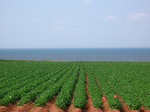
According to two reports published on Wednesday by the CGIAR Research Program on Climate Change, Agriculture and Food Security (CCAFS), food production and agriculture are not only drivers but also victims of climate change: Food systems contribute up to 29% of global greenhouse gas emissions, releasing 17,000 megatonnes of carbon dioxide per year, while agricultural production is responsible for 80% of total food system emissions. These figures account for the entire food chain, including transport and refrigeration of food, as well as the production of fertilisers. At the same time, agriculture is forced to adapt to altered conditions. “The food-related emissions and, conversely, the impacts of climate change on agriculture and the food system will profoundly alter the way we grow and produce food. This will affect different parts of the world in radically different ways, but all regions will have to change their current approach to what they grow and eat,” said Sonja Vermeulen, Head of Research at CCAFS and lead author of the study ‘Climate Change and Food Security’. According to the second study, ‘Recalibrating Food Production in the Developing World’, which analyses the impact of climate change on 22 of the world’s main crops, yields of the most important crops will decrease in many developing countries due to higher temperatures and unpredictable rainfall. By 2050, wheat production could decrease by 13%, rice yields by 15%, and African maize farmers could lose up to 20% of their yields. While potatoes will suffer with the higher temperatures, they might provide an opening for the cultivation of bananas in these areas. The drought-resistant cowpea plant could be an alternative to soybeans as a source of protein. Furthermore, warmer weather might increase the spread of pests and diseases. “The good news is that if farmers and food producers start to adapt now, they can stave off some of the dour food production and distribution scenarios laid out in this research”, said Philip Thornton, author of the study and a theme leader at CCAFS.
- CGIAR Climate: Agriculture and Food Production Contribute Up to 29 Percent of Global Greenhouse Gas Emissions According to Comprehensive Research Papers
- Report: Recalibrating Food Production in the Developing World: Global Warming Will Change More Than Just the Climate
- Annual Review of Environment and Resources: Climate Change and Food Systems
- BBC News: Bananas could replace potatoes in warming world
30.10.2012
European Parliament Vote: Danger of Food Speculation not averted

On Friday, the European Parliament adopted its report on the reform of the Markets in Financial Instruments Directive (MiFID), a draft legislation intended to regulate EU financial markets by restricting food price speculation and high-frequency trading. The Parliament voted by 495 to 15 in favour of the draft law, which introduces mandatory limits for traders speculating in commodity derivatives, a practice blamed for food price volatility. NGOs criticised the text for containing various loopholes. “Some Members of the European Parliament voted to curb food speculation, but it was not enough, and it remains a threat”, said Anne van Schaik, sustainable finance campaigner at Friends of the Earth Europe. NGOs had been advocating for a limit to the number of contracts individual traders and trader groups are allowed in order to prevent traders from “cornering” markets and influencing prices. However, the adopted proposal only limits the maximum net position that traders may hold rather than the number of contracts. Furthermore, the new rules do not include over-the-counter trading, so-called shadow transactions. European finance ministers are expected to agree on their position at the ECOFIN Council on November 13th. The Commission, Parliament and the Council of Ministers will then negotiate the final version of the text. According to Marc Olivier Herman, Oxfam’s EU Policy Adviser, “cracks in the text adopted today still need to be filled during talks with Member States to make sure it effectively staves off excessive speculation. This is crucial for the millions in poor countries who are hit by high and unpredictable food prices.”
- Oxfam: European Parliament draws line in the sand: financial markets must not play with food
- EurActiv: MEPs approve ban on ultrafast trading
- Friends of the Earth Europe: Food speculation still a threat following vote
- Open Letter to the EU Economic and Financial Affairs Council on curbing food speculation
26.10.2012
World Bank: Regional Trade Can Boost African Food Security
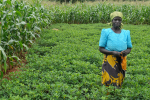
According to the World Bank, African countries could feed their populations if regional food trade was increased. Lifting trade barriers across the continent would reduce prices and enhance food security for the population, while concurrently raising income for small-scale farmers. For example, only 5% of Africa’s current imports of cereal come from other African nations. More food is being imported from Europe and Southeast Asia, thereby worsening trade balances. “Africa does have the means and opportunities to deal with and deliver improved food security for its citizens,” Makhtar Diop, World Bank vice-president for Africa, noted in the foreword to a new report published on Wednesday. “However, this potential is not being realised because farmers face more trade barriers in getting their food to market than anywhere else in the world.” Among the obstacles cited in the report are high transport costs, gaps in infrastructure, roadblocks and bribes at border posts, and outdated regulations, as well as a lack of agricultural knowledge-sharing among African countries, the bank said. Danielle Nierenberg, director of the US-based ‘Nourishing the Planet’ project, agrees with the need for more regional food trade within the African continent. However, she warned against approaches centered on expensive input such as hybrid seeds and chemical fertilisers. “I haven’t seen, from the World Bank or any other big funders, any significant new focus on agro-ecological solutions, even though all of the data is available,” Nierenberg told Inter Press Service.
- World Bank: Africa: Unlocking Regional Trade to Help Feed a Continent
- Inter Press Service: Regional Trade Key to African Food Security, World Bank Says
- BBC News: Africa trade barriers hit food production, says World Bank
- World Bank: Africa Can Help Feed Africa: Removing barriers to regional trade in food staples
23.10.2012
Cutting Food Waste Could Feed One Billion People
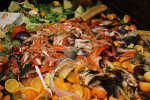
A new study published in the November edition of the peer-reviewed journal 'Science of the Total Environment' found that reducing food waste and increasing efficiency within the food production chain could cut food losses by half, thereby potentially feeding an additional billion people. For the first time, global food waste was estimated in terms of kilocalories per capita. A research team, led by Aalto University in Finland, calculated that 614 kilocalories per person are lost due to waste in the food production chain each day. By avoiding these losses, global production would provide 2,609 kilocalories of food daily. If the lowest loss percentage achieved in any region could be replicated at the global level, eight billion people could be fed with the resources currently used. The study also assessed the impact of food losses in relation to the use of resources: Every year, food losses waste 27 cubic metres of clean water, 0.031 hectares of agricultural land and 4.3 kilogrammes of fertiliser per person. “Agriculture uses over 90 per cent of the fresh water consumed by humans and most of the raw materials used in fertilisers. More efficient food production and the reduction of food losses are very important matters for the environment as well as future food security,” said Matti Kummu, lead author of the study and post-doctoral researcher at Aalto University. Researchers from VU University Amsterdam in the Netherlands and the University of Bonn in Germany also contributed to this study.
19.10.2012
EU Proposes Cap on Food-based Biofuels
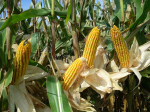
On Wednesday, the European Commission formally published a proposal to limit the amount of biofuels made from food crops in its renewable energy targets for 2020. The proposal introduces a 5% cap on food crop-based biofuels. However, the Commission has watered down plans to reduce the indirect climate impact of biofuels: Indirect land use changes (ILUC) occur if forests are cleared or peatland is dried to meet the growing demand for biofuels, which in turn leads to a net increase in carbon dioxide emissions. The proposed ILUC factors are now only for reporting purposes and carry no legal weight when determining whether biofuels meet minimum greenhouse gas saving thresholds. In a press conference on Wednesday, Climate Commissioner Connie Hedegaard and Energy Commissioner Guenther Oettinger said the proposal was “not perfect” but would send out the right signal to the biofuel industry to move on to second generation fuels made from waste, algae or straw. Many NGOs and environmentalists welcomed the proposal as a first step but felt the reform did not go far enough. “The proposed cap is higher than the current level of consumption of first generation biofuels in Europe. With close to 900 million people suffering hunger in the world what is needed is a rapid phase out of these biofuels”, said Oxfam’s EU biofuels expert Marc Olivier Herman. Friends of the Earth Europe stressed that “after two years of dithering the European Commission has virtually ignored the significant deforestation and climate emissions from biofuels.” The proposal will need to be agreed by the European Parliament and the Council of Ministers. According to ActionAid’s Head of Campaigns Belinda Calaguas, “the EU Member States and Parliament should walk away from this proposal and wait until the European Commission comes back with something that will actually tackle climate, land grabs and hunger.”

